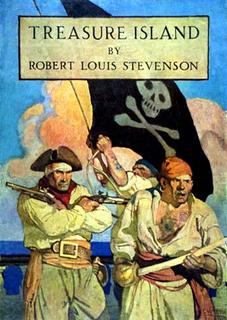
It is, it is a glorious thing,
To be a Pirate King.
-Gilbert & Sullivan, The Pirates of Penzance
I have always been fascinated by pirates. The allure began when a worn copy of R. L. Stevenson’s Treasure Island fell into my young hands and its cover illustration (boy-centrically rendered by N.C. Wyeth) beckoned the rascal in me to abandon the dull security of the
My childhood interest in this motley lot was heightened by proximity of Gardiner’s
Over time, my youthful dreams of piracy gave way to the harsh reality of adulthood. The more I studied the histories of these famous buccaneers, the less I identified with them. Soon I regarded them only as the cowardly, blood-soaked thiefs that they were. Well, kinda. Growing up sucks, sometimes, but we also make allowances for our dreams.
And our dreams are often girded by reality. Stevenson’s tale of treachery and redemption was not entirely fictitious. It made ample use of the best known source for pirate lore: A General History of the Robberies & Murders of the most notorious Pyrates . First published in 1724, Captain Charles Johnson’s account of the lives of infamous English and Welsh pirates provides the foundation for nearly every tale ever woven about piracy in the
The identity of Captain Johnson remains a mystery. Although he was once widely thought to be Daniel Defoe, the author of Robinson Crusoe, that enchanting theory has in recent years, unfortunately, been debunked. Nevertheless Captain Johnson knew a great deal about these scourges of the
While the “Golden Age” of piracy has long since slipped its cable and drifted into the dreamy man-made
reveals that piracy is still rampant in many parts of the world – particularly in the islands of
As was true in that “Golden Age,” however, the plodding response to this international threat to commerce by complacent or complicite governments seems destined to prolong and exacerbate the menace these criminals pose. Captain Johnson wrote succinctly of this pendent danger in his introduction to Pyrates some 270 years ago:
It has been the case heretofore, that when a single pirate has been suffered to range the seas, as not being the worth the notice of the government, he has by degrees grown so powerful, as to put them to the expense of a great deal of blood and treasure, before he was suppressed.
In other words, and as any dog will tell, a single flea is just an annoyance…but there is never just one flea.
Which brings me to the point of this exercise: This past summer the magazine Legal Affairs ran a piece by lawyer and historian Douglas R. Burgess, Jr. entitled “The Dread Pirate Bin Laden: How thinking of terrorists as pirates can help win the war on terror.”
I must admit that I was immediately on guard: By any basic measure of law, pirates are common criminals – right and wrong and the law of the sea and all that. If not deserving of such, at least pirates squeak through entitled to the form of justice served by the very courts established by those they have wronged.
Terrorists, on the other hand, or at least by my thinking, are vile, fanatical animals who seek to subjugate through fear and death those whom they can not convince by faith or reason. As these villains profess no fear or repentance towards the death of others, then plain justice should mete only the same to them.
Upon reflection, however, Mr. Burgess' idea has become more palatable to me. Can nations create a unified body of law that would not only cast those practitioners of terror into hell, but also provide for universal response to those who harbored or succored such criminals – or as
The vageries of "criminal" versus "piratical" acts has long been a feature of civilized diplomacy. Again, from Captain Johnson's Pyrates comes "an abstract of the civil law and statute law now in force in relation to piracy:"
A Pyrate is Hostis humanis generis, a common Enemy, with whom neither Faith nor Oath is to be kept, according to Tully. And by the Laws of Nature, Princes and States are responsible for their Neglect, if they do not provide Remedies for restraining these sorts of Robberies. Though Pyrates are called common Enemies, yet they are properly not to be term'd so. He is only to be honoured'd with that Name, says Cicero, who hath a Commonwealth, a Court, a League: but when they have reduced themselves into a Government of State, as those of Algier, Sally, Tripoli, Tunis and the like, they then are allowed the Solemnities of War, and the Rights of Legation.
Are terrorists "criminals" in the justicable sense of the word? Is there an international compact capable of responding to terrorism effectively against boththese enemies of the human race and their diplomatic supporters? Is hanging enough?
I want to explore this with you further, and I will.
But right now, this pirate has got to go to bed.
5 comments:
Oh, well done! This was worth waiting for. It's so good I don't even know where to start.
So, Billy, do you like pirates?
I like pie.
But what about pudding?
Now I have to drag out all my pirate books again just to refresh my memory.
Shame on you. Captain Blood was a favorite, as he was redeemed...
Looks like I will be reading this weekend.
heh.
Post a Comment